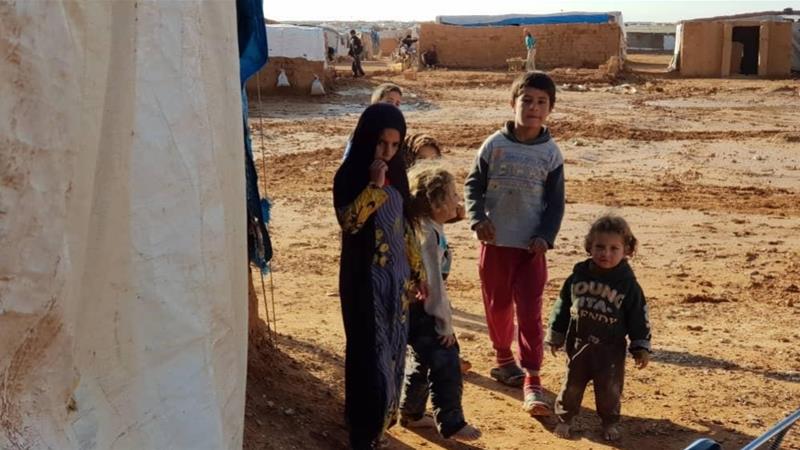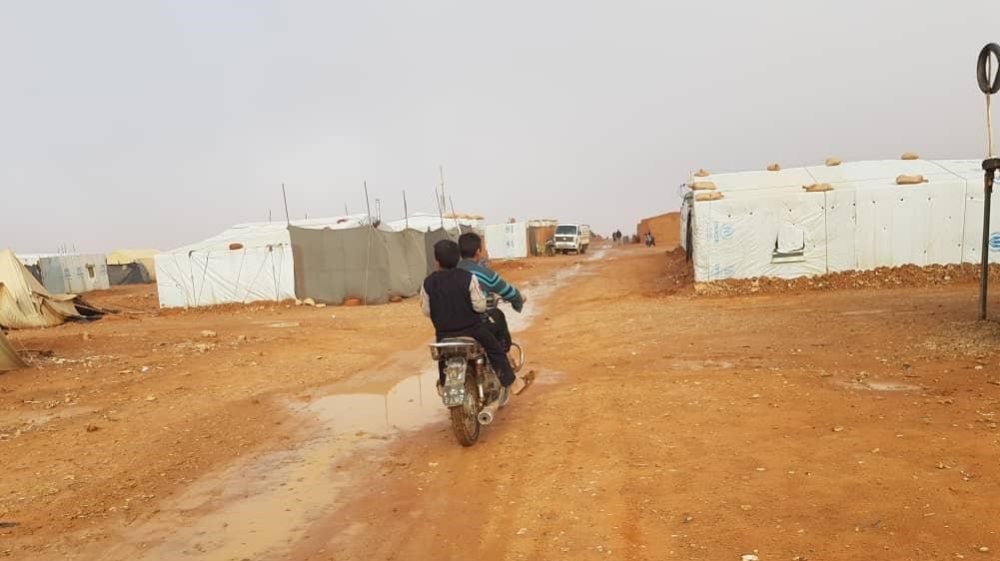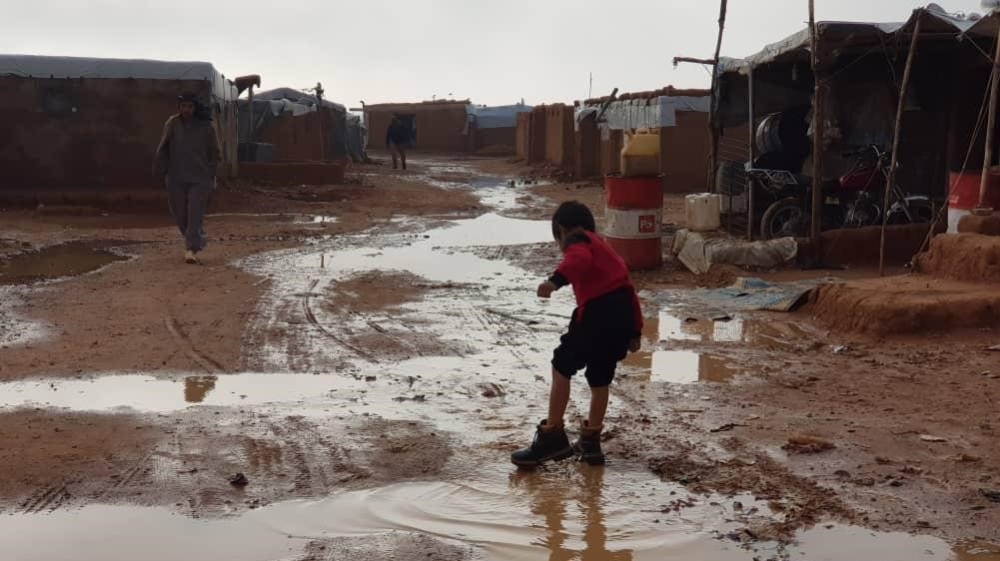Home » Middle East »
Syria's war: Who is responsible for the dying children of Rukban?
The ‘man-made’ tragedy in the encampment of about 50,000 people already killed eight children this winter.
Beirut, Lebanon – There was no heating to keep the tent warm. There was no money to buy the medicine which might have saved his daughter. There was not even enough milk in the breast of the mother – suffering from malnutrition – to feed the girl. There is nothing but misery in this camp.
That is how Abdul Karim described the death of his two-month-old daughter Khadija to his friend Abdul Fattah Basleh in Rukban refugee camp in southern Syria, an encampment of about 50,000 people.
Khadija was one of the at least eight children who have died in the camp this winter. The United Nations children’s agency, UNICEF, which has been seeking permission to send life-saving aid, called the deaths a “man-made” tragedy.
“The lives of babies continue to be cut short by health conditions that are preventable or treatable,” said Geert Cappelaere, UNICEF’s regional director for the Middle East.
He said that “more children will die, day in, and day out”, in Rukban and areas around it, unless they are provided with safer shelters and reliable healthcare.
The camp lies in the arid landscape alongside the sand-berms demarcating the Jordanian border.
ISIL danger
Jordan shut its gates and stopped the aid flow in 2016 suspecting the camp harbours sleeper cells of the Islamic State of Iraq and the Levant (ISIL, also known as ISIS) armed group, and only supplies water.
It is in the pocket controlled by the United States-led coalition troops stationed at the Tanf base nearby. But they are only there to wipe out the remnants of ISIL from their last hideouts in the neighbourhood and to contain the Iranian influence over Syria.
They opted for the area to establish their presence for strategic reasons.
The Syrian government stands guard outside the 55km security zone agreed upon between Russia and the US, to avoid a confrontation with the American soldiers.
Damascus has allowed only two aid convoys to go through this year.
The government has systematically used the lack of basic necessities in besieged areas to coerce people into giving in to President Bashar al-Assad’s rule.
Karim did not even consider crossing over to the government-held territory, which has food and medicine and doctors, in case they suspected him of being a “terrorist” supporter and arrest him, a common fear.
He did want to take baby Khadija to a medical centre in Jordan, “but he could not”, said his friend Basleh, “because they have banned us”.
Jordan sealed the border but has sporadically taken in patients in need of immediate healthcare.
Khadijah died of high fever and inflammation even before she could be taken there.
The conditions in the camp, other residents said, make it unlivable.
UN aid
Wissam Khaled* fled from Palmyra when the war intensified in his city. He said that the last batch of aid from the UN came in November after months of hiatus and was barely enough for a fortnight.
The people, he said, are relying on smugglers in the government-controlled areas who sell everything at exorbitant rates. “Food, medicine, all are coming only from the smugglers and it is very expensive,” he said. “People cannot afford it because they do not have any money, because there is no work here.”
Mohammed al-Sharkh, the husband of 28-year-old Sundus Fatahallah, regrets his inability to have the cooking stove repaired.
One morning, a few days ago, as his wife made breakfast, he said, the kerosene spilled and burned her severely, also causing minor burns to the children.
“She had been asking me to fix it,” he said, “But I could not, because I did not have enough money.”
Rukban’s Syrians are most disappointed with the US for not helping despite being just 16km from the camp.
“The Americans have not sent anything, no doctors,” Wissam said. “We only have a few nurses but they do not know much and have very limited medicines.”
Bassam Barabandi, a former Syrian diplomat who now runs an activist group in the US, said that while the nurses are provided with some “basic medical training”, by the US, the latter has refused to do more.
“The American army always says their mandate is to fight ISIS only,” he said. “They say they have no humanitarian mandate and do not want to own this problem.”
His view resonated among other Syria experts.
Arun Lund, a fellow with the Century Foundation, said the US is a “de facto occupying power” on the ground, yet it has refrained from assuming responsibility.
“The US troops at Tanf don’t currently have the budget for it and want to keep it someone else’s problem,” he said. “They also can’t access the camp itself under current rules, since the military deems it unsafe and full of potential hostiles.”
The camp is controlled by several groups, including the Pentagon-backed Free Syrian Army-affiliated Maghawir al-Thawra. ISIL members are also believed to be hiding in the camp.
Elizabeth Tsurkov, an activist and a research fellow at Israeli think-tank Forum for Regional Thinking, said that the US has failed to leverage its position with Jordan, which could easily supply aid to Rukban. “The US, which has forces stationed in the area, appears unable to compel its ally Jordan to provide the residents of camps in Rukban with this much-needed aid,” she said.
However, Wissam thinks the presence of the US troops is the best safety measure they have against the Syrian government taking over. As the troops’ exit looms, there is panic in the camp.
“This is more important than food and medicine,” Wissam added. “If the American soldiers leave, it will be very dangerous for us. Then the regime forces will come to arrest us, or we don’t know what will happen. People are very scared.”
ISIL members are also believed to be hiding in the camp [Al Jazeera]
Abu Al Athir, head of security of the Maghawir al-Thawra, said that so far, even after US President Donald Trump’s announcement to withdraw troops, the American soldiers are conducting “mutual patrols” and are delivering on “logistical and military support”. But he is not sure how long that will carry on for.
He said anticipating the government’s seizure of Rukban, many people have already begun to reconcile with Assad and are heading back to government-controlled areas. Many others though, despite the harsh life in the camp, cannot take that risk.
“Many people cannot do this and want to go north,” Athir said. “As the coalition is withdrawn, we would definitely go north to the opposition-held areas otherwise we will be decimated by the regime.”
On Wednesday, ISIL claimed responsibility for a bomb attack on the US security personnel in Manbij in northeast Syria, another town with a US base. Nineteen people were killed in the blast.
It is uncertain if the attack will alter Trump’s position on the withdrawal. If he does change his mind, it will be a relief for the people of Rukban, among others who have been hoping the US troops will stay until there is a final political solution to the Syrian war.
For now, the children of Rukban face a more immediate threat; plummeting temperatures and no aid.
“History will judge us for these entirely avoidable deaths,” Cappelaere said.
But who will history hold accountable?
The humanitarian catastrophe in Rukban has been exacerbated by the Syrian government, Jordan, the quarrelling groups within the camp and left to its devices by the US-led coalition.
* Name changed to protect the identity.
Source: Read Full Article





